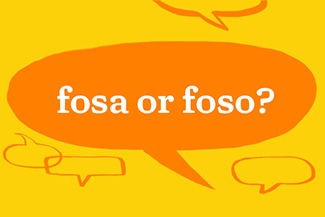Our weekly blog for French learners teaches you a new word to expand your vocabulary and understanding. In this edition, we’re looking at the word coin. We’ll start by listening to the pronunciation in the audio clip below. Listening to the pronunciation is really important, as lots of English speakers might assume coin will sound like a word that we already know in English…
Well, it certainly sounds different from ‘coin’ – but does it mean the same thing? Nope! Like many words in French, this is a ‘false friend’. To us, it relates to money and perhaps precious metals. To French speakers, coin means a corner or a spot, area or location.
Coin is a masculine noun. Remember that you can identify the gender of a masculine noun if you see articles such as un or le preceding the word. Another important point is knowing how to turn singular nouns into plurals, but in the case of coin, it’s fairly simple. You just need to add the letter s to make coins.
Now it’s time to look at some examples of coin in action. The first examples use coin in the sense of ‘corner’:
au coin de… on / at / in the corner of…
La pharmacie se trouve au coin de cette rue. The pharmacy is on the corner of this street.
J’ai marqué le numéro au coin de la page. I marked the number in the corner of the page.
Notre grand-mère s’assoit toujours au coin du feu. Our grandmother always sits by the fireside.
du coin de l’œil out the corner of the eye
un sourire en coin half-smile; smirk (literally a ‘corner smile’)
aller au petit coin to go to the toilet (the equivalent in English might be going to ‘the little boys’ / girls’ room’, or ‘the loo’)
The next few examples use coin in the sense of a local place. Using coin in this way is fairly casual, so be wary of this when speaking in a formal context:
les gens du coin local people
dans le coin locally; in the area / locale / neighbourhood
T’es du coin? Are you from round here?
Nous venons de prendre un verre au café du coin. We just had a drink at the local café.
Je cherche un bon coin pour danser. Tu en connais ? I’m looking for a good spot for dancing. Do you know any?
As well as being able to use coin in everyday French, knowing this noun is also helpful in another way. At some point, you might come across its related verb or adjective:
coincer to corner; to block; to be jammed / stuck
être coincé(e) to be cornered; blocked; jammed; stuck; wedged
And finally, just a bonus point for fun – coin-coin is the French equivalent of ‘quack-quack’. Translating animal noises might not seem useful for everyday French, but you never know when you might need it! Well done on adding yet another new word to your French vocab list. Keep coming back to our weekly blog for more help, advice and of course words – we’ll always be in your corner!
Written by Holly Tarbet, freelance copywriter and editor.
All opinions expressed on this blog are those of the individual writers, and do not necessarily reflect the opinions or policies of Collins, or its parent company, HarperCollins.



